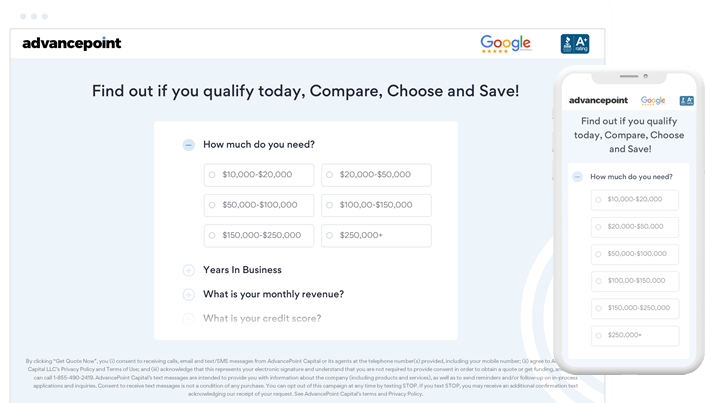
What is a Working Capital Loan?
Working capital loans are a short term option to manage small businesses' daily operational expenses. Working capital is what keeps a company afloat day in and day out. If you need to cover these day-to-day short-term business expenses and pay bills, particularly during liquidity issues, working capital loans provide a way to keep operations running smoothly with shorter terms and smaller loan amounts.
Working capital loans aren’t used to purchase long-term investments or current assets but rather to fuel everyday cash-on-hand needs. These loans can offer a financial cushion for businesses facing liquidity issues, covering anything from rent and payroll to debt payments and utilities if your existing assets and liabilities don’t add up.
One of the most crucial components business owners must contend with is managing operating capital in any business. Many companies, when confronting liquidity issues, need access to capital at one point or another to supplement cash flow issues and help cover operational costs. Working capital loans, often also called cash flow loans, are the funding solution to get you through those rough patches when cash is low that you can run into while running your company.
How does a Working Capital Loan Work?
Working capital loans are a category of loans that are short term in nature. What's common about working capital loan options is that they are designed to manage the fluctuations in a business's cash flow. These loans cater to immediate financial needs, such as covering revenue shortages, mitigating unexpected expenses, or facilitating emergency purchases. Working capital loan options boast unique features, rates, terms, and conditions, ranging from a business line of credit to business term loans, merchant cash advances, or invoice factoring, each structured to help maintain smooth operations during the variant financial cycles businesses often experience.
Uses of Working Capital Loans: The Most Common Reasons to get a Working Capital Loan
Working capital loans may be necessary to cover expenses to move your business forward and proliferate growth when your funds are short. Cash flow is crucial for many reasons. Let's discover the most common reasons.
- Covering payroll requirements - Employees obviously expect to get a paycheck, which is vital for maintaining morale and productivity.
- Utilities Expenses - Having utilities is not an option, but a requirement to run a business, ensuring operations remain uninterrupted.
- Other Operating Expenses - Other conditions that go into running a business must be covered, such as rent or software subscriptions.
- Inventory - Reliable inventory purchases are essential to stock inventory adequately to meet the demands of customers or risk losing sales, especially during peak seasons.
- Purchases - When equipment goes down, it can negatively impact operations. Working capital is needed for timely inventory purchases and to keep the business from going offline, ensuring day-to-day activities can continue without a hitch.
How much working capital does your business need?
The amount you will need for working capital will depend on the use of funds and how long you think the business will be at a revenue deficit. Projecting future revenues can be difficult, but making estimations is important to determine how much you will need.
Key factors to consider;
- Evaluate Profit/Loss- Consider your monthly profit & loss statement.
- Project Future Revenues- Plot your future revenues over the next 6 months
- Consider Monthly Expenses- Breakdown all monthly expenses on a spreadsheet.
- Anticipate Unforeseen Future Expenses- Try and predict future expenses that may arise.
- Cash reserves- Its always good to have at least 2 month of cash reserves to cover expenses.
- Seasonal revenue issues- Anticipate revenue based on the seasonality of the business.
- Purchases- Consider not only current purchase needs but also future needs such as equipment purchases or repairs.
What are the Best Working Capital Loans For Small Businesses?
The most common types of working capital loans are short-term loans and business lines of credit. A short-term loan is relatively self-explanatory — a small business loan with a fixed, short-term repayment schedule. You also receive a fixed amount of cash in one lump sum with these small business loans.
A line of credit works a bit differently, allowing you some additional flexibility. Businesses can borrow money up to a certain limit and only pay interest on what they actually borrow. They can draw and repay as needed, as long as they don’t exceed this limit.
Whether you’re low on cash flow from daily operations or suffering from unpaid invoices, or perhaps business growth pains without sufficient cash flow, a working capital loan can be the answer and AdvancePoint is here to help find the best solution for your business capital needs.
Unlike traditional banks or direct lenders, Advancepoint has a network of lenders with a variety of business resources and financing products for small businesses at competitive interest rates and loan costs. We can get you approved and funded in as little as 1 business day.

Get Started Today
AdvancePoint Capital makes the loan application process a simple, straightforward experience.
Working Capital Loans for New Businesses

Business Line of Credit
Evaluating creditworthiness is a crucial step for lenders when providing a line of credit. This financial product enables businesses to access funds up to a preset limit and charges interest solely on the amount utilized, akin to how credit cards function. As a versatile working capital solution, a line of credit considers not only personal FICO scores but also business performance, making it ideal for companies seeking flexibility.
- Flexible credit facility
- Credit scores as low as 620 considered, reflecting a broader understanding of creditworthiness
- Fast and simple application process
- Greta Rates

Small Business Administration SBA Loans
The SBA offers a variety of small SBA business term loans at attractive interest rates and terms. Regarding eligibility requirements, the SBA has stringent qualifications that assess both your business and personal credit. While the paperwork, including forms SBA specifies, can be voluminous, navigating through these requirements is worthwhile to access favorable financing options.
- Best Rates & Terms rates starting at 8%
- Must have good credit to apply
- No down payment required
- For those concerned about collateral, many lenders, including the SBA, do require collateral, but this can vary by lender and loan type.
- Application process requires significant documentation, including detailed financial records and business plans to satisfy these eligibility requirements.

Short-Term Business Loans
Short-term business loans, known for their brief repayment periods that usually range between 6 to 18 months, are tailored to meet the quick-turnaround financial needs of businesses. This type of financing can be advantageous due to its lower risk profile and structured repayment schedules, often in the form of daily or weekly payments. For businesses looking for lending options without the long-term commitment, these loans are valuable. They also open doors for lenders to consider applicants with lower personal credit scores due to the reduced lending risk and may offer simplified documentation requirements for approval. Notably, this is an unsecured loan, precluding the necessity for real estate as collateral. A minimum annual revenue of $200,000 is typically required. It's important for borrowers to be aware of potential repayment fees and to review whether an origination fee might increase the overall cost of borrowing.
- Completive rates & Fees
- All credit considered
- Must be in business greater than 1 year
- Streamlined application process

Merchant Cash Advances
A merchant cash advance provides upfront capital to businesses based on annual revenue and is repaid to merchant cash advance providers with a premium. These repayments are determined by a set percentage of future credit card transactions. Unlike traditional loans, there are no harsh repayment penalties or prepayment penalties, offering flexible financial solutions for businesses.
- Revenue & merchant processing based business funding
- Paid back by a percentage of future sales
- Simple and fast application process
- Same day funding available

Business Cash Advance
A business cash advance, also referred to as a merchant cash advance, is a form of sales-based financing where a lender provides a lump sum of money upfront to a business. In return, the business agrees to pay back the advance with a portion of its future sales, ensuring the repayment process remains flexible. As opposed to traditional loans that might require business collateral, this cash advance is a convenient option for businesses looking to avoid collateralization. Credit card sales are not a necessity for this product, which broadens its accessibility for many types of businesses with varying sales mechanisms. There is no minimum credit score requirement for some businesses, which can be particularly useful for startups or companies with less established credit histories.
- Sales-based financing
- Flexible repayment process catered to the company's cash flow
- Early pay discounts available to incentivize timely repayment
- Streamlined application with limited documentation for quick approval

Business Credit Cards
Credit cards are a great additional option in conjunction with other business financing options, that can be used to help support funding needs. Credit cards are lines of credit that do have a personal guarantee and are often contingent upon the cardholder's FICO credit score. Must have good credit history and decent credit scores for approval, with certain lenders like American Express requiring a minimum FICO credit score of at least 660 for their business line of credit. A strong FICO score bolsters your financial profile and may facilitate better financing options. Credit cards help you improve credit for future loans.
- Issued a card for purchases and to pay expenses
- Instant approvals
- No documentation required in many cases
- Good credit required

Invoice Financing
Invoice financing, also known as invoice factoring, is a financial solution tailored for businesses that frequently issue invoices. This financing option facilitates cash flow by providing advances on outstanding invoices that have not yet been paid, according to the repayment terms. Typically, a factoring company might pay between 70% to 90% of the total invoice amount, ensuring you maintain working capital while awaiting customer payment. Such an advance is pivotal for maintaining operational stability without the burden of accumulating additional debt. Furthermore, factoring rates start as low as 1%, making this an affordable option for managing cash flow efficiently. With invoice financing, the worry of delinquent invoices is mitigated, since advances can be up to 95% of the invoice amount, as long as they aren't late per the accounts receivable aging report.
- An advance on the purchase of an issued invoice
- Accelerates cash flow
- Factor rates start at 1%
- Does not build up debt
Pros and Cons of Working Capital Loans
Pro's
- Fast Business Funding Solutions- Most funding solutions can be delivered in a day
- Flexible Options- Many different uses and business needs can be accommodated.
- Minimum Requirements- Limited documentation is required for most options.
- Easier Qualifications- Qualifications are easier than other business funding solutions.
Con's
- Interest rates- Interest rates and or factor rates may be higher than traditional financing.
- Terms- Terms tend to be shorter than long term business loans like SBA.
- Loan Amounts- Due to the shorter term length the amount of financing may be less.
- Business Guarantees- The business may have to provide a business performance guarantee
The fast, convenient, and straightforward way to get the capital you need for your business – now!
Get your quote today by filling out our simple form.

Financial Institutions that Provide Working Capital Loans
A variety of entities that offer a working capital loan include:
- Market Place Business Funding Providers
- Business Loan Brokers
- Online Lenders (FinTech)
- Invoice factoring Companies
- Banks
Why Apply for a Working Capital Loan?
- Fast approval
- Consideration of your request regardless of your credit
- Flexible repayment options
- A simple application process
- Reasonable, competitive terms
- Speedy access to funds
How to Apply for a Working Capital Loan?
We know that you’re busy, and we want to make the application process for a working capital loan with AdvancePoint Capital as easy as possible. Our simple process can get the wheels in motion any time you have a few minutes to spare. If you're ready to become a borrower, AdvancePoint Capital is here to streamline your experience.
Starting with this online form, let us know what your business challenges are so that our 24-hour live agents can begin building a solution for you. On your time, you can contact an agent, or we will contact you. Once we’re in communication, we’ll be able to discuss your options and answer any questions you may have. We’re here to help guide you along and make sure you’re getting the capital you need to grow. To quality as a working capital borrower, keep in mind you must meet certain age and business use criteria for the loan.
- Application- The application process is streamlined with a 1-page application, and a request for documents, which typically just includes 3 months of business bank statements, can get you offers to consider.
- Offers- Receive offer(s) in writing with a term sheet and/or disclosures so that you can consider the products, features, rates, terms, and conditions to fund. When making a selection you should consider the need and make sure the solution best solves the problem. Shop and compare offers so that you make the best decision.
- Selection- Once you select an option, you will need to sign an agreement and provide closing stipulations like a driver's license and other verifications to get a clear to fund.
- Funding- Upon providing all closing stipulations, underwriting will review and clear to fund your business bank account. Banks and credit unions could be powerful allies for firms with strong credit backgrounds, whereas online lenders may offer solutions for those with less-than-perfect credit.
In a few hours, we find a lender to work with you, and – typically within a few business hours – you’ll have your approval. We won’t keep you waiting around. We’re all about creating a simple approach to the capital you need. Once the paperwork is finalized, your money will be available in as little as one business day so you can move on with all of the responsibilities involved in owning a company.





